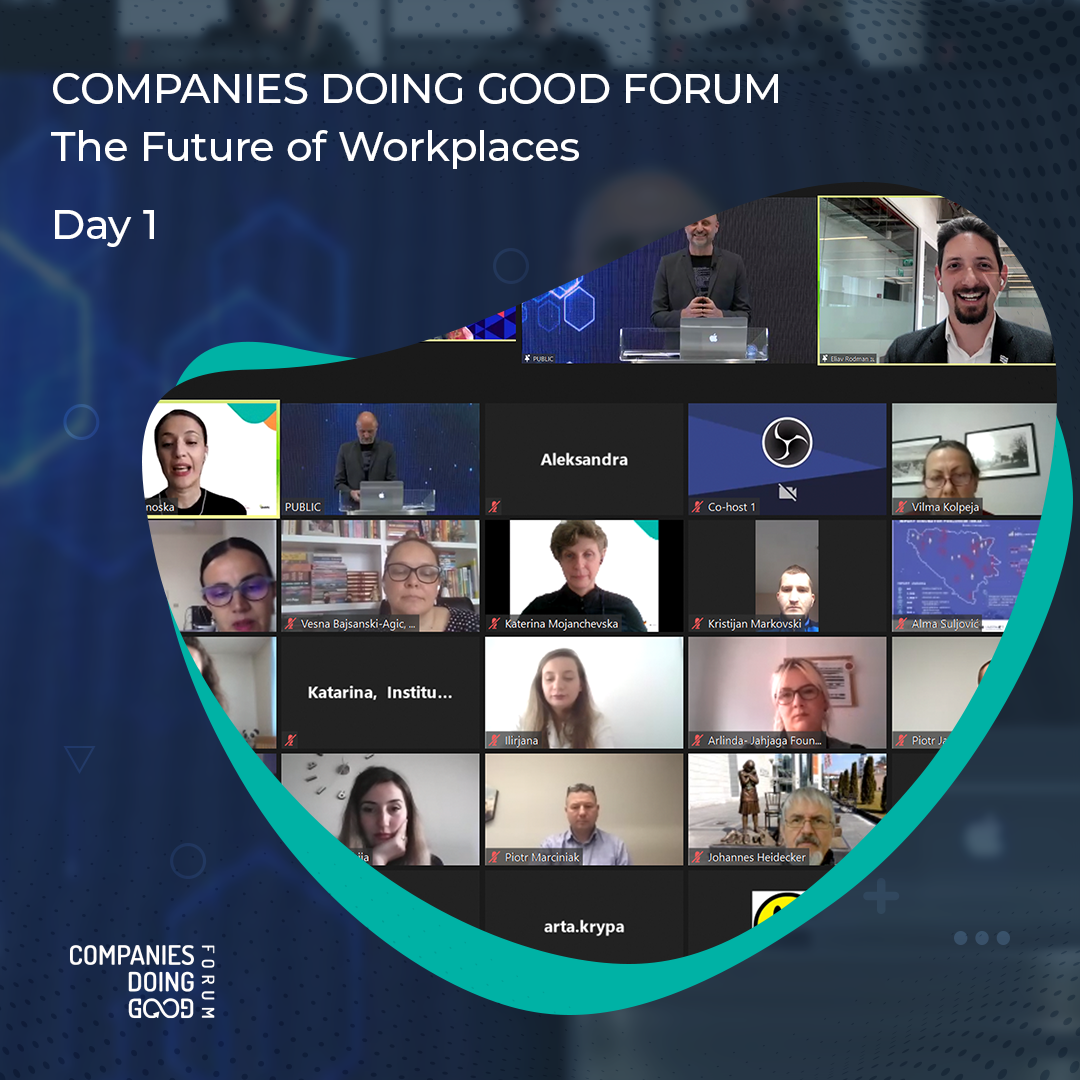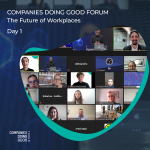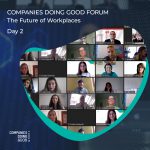The future of workplaces is inseparable from the future of people

The starting day of the Companies Doing Good Forum 2021 brought a vision for the future of workplaces that will focus on people, their values, personality and character, in which businesses will partner with social enterprises in order to do good for the communities.
With speakers from the country and from France, Israel, Italy, Belgium, Bosnia and Herzegovina, and Poland, the Forum brought a perspective in which we emphasize joint action for the benefit of all of us.
The event was opened by the Deputy Prime Minister in charge of Economic Affairs, Fatmir Bytyqi.
– Local challenges are also global, especially when it comes to the pandemic. That is why we need to restructure our existing economy into a social economy and focus on the vulnerable groups. We do not know what awaits us tomorrow. Through social entrepreneurship and through the implementation of the Sustainable Development Goals, we can ensure that everyone gets equal opportunities in our society – Bytyqi said.
The Ambassador of Germany in the country, Anke Gisela Holstein shared that one of the most important partners of the Forum are the civil society organizations.
– I would like to congratulate them for their achievements and efforts to support the development of social entrepreneurship and for being true pioneers in social mentoring in the country and the region. Supporting today’s Forum, Deutsche GesellschaftfürInternationale Zusammenarbeit (GIZ) GmbH, wants to emphasize the importance of the topic of social inclusion, especially the cultural, social and economic participation of vulnerable groups in society. Germany and the world are committed to achieving the Sustainable Development Goals, which are a roadmap for a better and sustainable future for all. We are glad that one of the goals of today’s forum is in line with some of the fundamental elements of this process: building partnerships and emphasizing that no one is left out – Holstein said. The Executive Director of Public, the organization that organizes the Forum, shared that, in the desired social systems, inclusive jobs, inclusive businesses and inclusive growth are high priorities.
– In them, growth will not be monitored only through GDP, but through a set of indicators that will simultaneously carry information as to what are the entities that benefit from the economic growth and whether the growth is sustainable in terms of its effects on the environment such as the impact on the human well-being. With this Forum we will try to see the role of different sectors in creating a new social system in which the goals for sustainable development are incorporated and the contribution to them will not be an effort, but an established and accepted way of acting – Ilijevski said.
Decathlon’s vision leader Charlie Felgate shared that they are a decentralized company that operates through collective consciousness and applies a bottom-up approach.
– The employees themselves bring the main ideas, and my job is to listen to them and implement them. When we talk about the future of workplaces, first we have to talk about the future of people. As a
company we exist because of others, buyers, suppliers, people who make coffee and tea, we are all human and we are all important. We started asking people what they wanted for themselves, their family and their society, instead of saying what we thought they should. When we changed the approach, we got completely different answers. The problems we face, we can solve together, only together! That’s the only way – Felgate said.
He, as one of the keynote speakers, pointed out that the company employs on the basis of values:
– Only then you are more inclusive in recruiting. We are not interested in modern universities and diplomas. Inclusion is very important to us, so I quote my friend who says: diversity is to be invited to a party, inclusion is to be invited to dance.
Eliav Rodman is an entrepreneur from the startup “MyInterview”, Israel. He explains that the two founders of the company had completely different characters, but realized that their CVs are almost identical. – Hence the idea to do something about the classic way of looking for staff and interviewing, in order to be able to find the right candidates and recognize their true values. MyInterview platform focuses on recruiting people by focusing on the candidate’s character instead of the CV. – If a company receives 100 applications for one job position, with the traditional method of interviewing, the one who applied 99th has a very small chance to get the job even though it is perhaps one of the best. Through our platform, algorithms allow no one to be missed and everyone gets an equal chance, there is no place for bias in the future of workplaces – Rodman said. International Labor Organization (ILO) Senior Employment Specialist Daniela Zampini shared that the outcome of working with different groups (businesses, civic organizations, public institutions) is very good because it enriches our perceptions:
– We have seen that those jobs that are usually low paid are actually among the most important ones that are essential for the functioning of the economy. Digitization is only one part of the whole equation. Until we start looking at the labor market in a more articulate way, we will not be able to see the big picture.
Zampini also shared the main goals for improving the future of jobs:
– To invest in people and their abilities, to give them opportunities, to invest in remodeling and reforming institutions, as well as in dialogue and understanding between all parties – businesses, institutions, civil society, workers/citizens.
Karel Vanderporten, a social economy expert at the European Commission, shared ways of working between stakeholders in the social economy and conventional businesses. He pointed to a number of degrees and differences between philanthropic partnerships, which are one-way and commonplace, all the way to transformational change – where both sides align their missions to maximize mutual benefit and social impact.
The first day also brought a panel session on the topic of cooperation between the public, private and civil society stakeholders, through an actual example from Poland.
Businessman Piotr Janowicz of Constructa, Poland, explained that now, unlike before, people look at business differently.
– Fortunately, the business that my father started was successful and although the main goal was profit, today it allows us to focus on other things, to work for much more than profit and to do something significant for our community. That is how we realized the investment in our local community.
Piotr Marciniak, an architect and professor from Poland, presented the social space they had created together with Construkta and the Barca Foundation, which had brought many benefits to the local community.
– Our project focuses on social space. Through the revitalization of the fortresses we preserve the history, we dedicate special rooms intended for social economy, workshops, art, exhibitions and a large green area, cafes and restaurants. As architects, we want to solve the problem of the environment. That is our future – shared Maciniak. Vesna Bajsanski Agic from the Mosaic Foundation in Bosnia and Herzegovina pointed out that businesses need to solve social problems.
– The question we used to ask our children “what do you want to be when you grow up?” should be replaced with the question “what problems do you want to solve when you grow up?”. When we create social businesses and rely only on state support, we do nothing. If the business is not alive from sales, it is not alive in the market, it does not exist. It can not be called a business – she said.
Kosta Petrov, Director of the Fund for Innovation, shared that if we want to see change and impact, the businesses, institutions and civil society must all work together.
– It is an equation, if only one part works well, the equation is not right. The future depends on the social influence, we should accept this and act in that direction. I ask people from the startup sphere what is the main reason why they want to realize their business and tell them that if the answer is only profit, then they better not start. At the core, there should always be a desire to solve a particular problem of their target group.
Join us tomorrow on the second day, more interesting discussions are coming!


